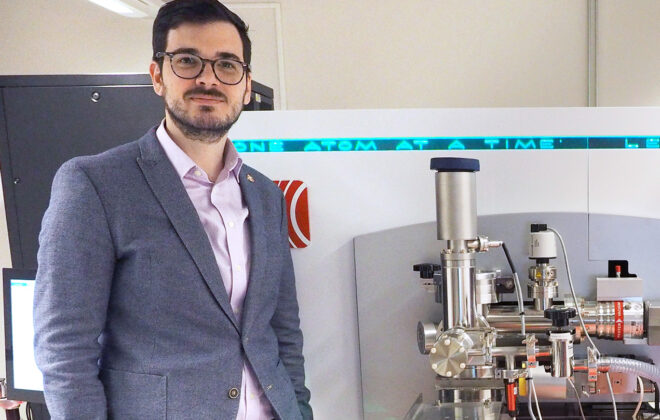Insect wings teach us about the super repellent state

How is it that some insects are capable of keeping its wings clean? Knowledge on this applied in the nano lab can help us make better droplet repellents.
Nature have engineered surfaces like leaves or skins capable of interacting with water droplets in different ways. For example, if you deposited a droplet of water on a Lotus leaf, the droplet will roll on the surface collecting dust particles, keeping the leaves clean even when the Lotus grow in dirty waters. We call this property self-cleaning or super repellent state. Understanding and controlling this property is essential to develop ice repellent surfaces, self-cleaning surfaces, etc.
Like the Lotus leaf, the wing of the cicada is textured with micro sized conical structures that repels water droplets, but also micro sized conical structures artificially fabricated have shown similar properties. But why? This question was addressed in the our recent article in Applied Physics Letters. Our results show that conical structures are capable of achieving the super repellent state as a geometrical property of the cones. In particular, it is found that as the cones get sharper the property is enhanced.
Conical structure up close
The conical structure at a micro level looks a little like spikes. Photo taken at the NTNU Nanolab, by Wenwu Ding.

Conical structure with super repellent state
Below is an illustration of how droplets behave on different surfaces. On the upper left is when droplets land on a plain silicon surface. Upper right: when the droplets land on a surface with conical structures. The left side droplet is more difficult to slide but the right side droplet can slide at very low tilting angle. Ill.: NTNU EPT

See scientific publication:
- Appl. Phys. Lett. 115, 053703 (2019); https://doi.org/10.1063/1.5096776
Blog post originally published on www.ntnutechzone.no on October 3rd, 2019

Wenwu Ding
Wenwu Ding is a PhD candidate at NTNU – Department of Energy and Process Engineering, belonging to the Thermal Two-Phase Flow Laboratory (ThTPFLab).
Search
Søk
Categories
- Arctic Research
- Arkitektur
- Bærekraft
- Bioingeniørfag
- Biologi
- Biology
- Biomedical Laboratory Science
- Biotechnology
- Bioteknologi
- Chemical Engineering
- Chemistry
- Climate
- Computer Science
- Datateknologi
- Digital
- Elektronikk
- Energi
- Energi
- Energy
- Engineering
- Engineering
- Environment
- Food Science
- Forskning
- Fysikk
- Fysikk
- Havbruk
- Informasjonsteknologi
- Informasjonsteknologi
- Ingeniørvitenskap
- Kjemi
- Kjemisk prosessteknologi
- Kjemisk prosessteknologi
- Kreftbehandling
- Kybernetikk
- Marine Technology
- Materialer
- Materials Science
- Materialteknologi
- Matvitenskap
- Meninger
- Miljø
- Min ph.d.
- My PhD
- My PhD
- My postdoc
- Nanotechnology
- Nanoteknologi
- Ocean
- Oil and gas
- Physics
- Research
- Simulering og visualisering
- Spør en forsker
- Studentliv
- Sustainability
- Ukategorisert
- Universitetsliv
- University Life
Kategorier
- Arctic Research
- Arkitektur
- Bærekraft
- Bioingeniørfag
- Biologi
- Biology
- Biomedical Laboratory Science
- Biotechnology
- Bioteknologi
- Chemical Engineering
- Chemistry
- Climate
- Computer Science
- Datateknologi
- Digital
- Elektronikk
- Energi
- Energi
- Energy
- Engineering
- Engineering
- Environment
- Food Science
- Forskning
- Fysikk
- Fysikk
- Havbruk
- Informasjonsteknologi
- Informasjonsteknologi
- Ingeniørvitenskap
- Kjemi
- Kjemisk prosessteknologi
- Kjemisk prosessteknologi
- Kreftbehandling
- Kybernetikk
- Marine Technology
- Materialer
- Materials Science
- Materialteknologi
- Matvitenskap
- Meninger
- Miljø
- Min ph.d.
- My PhD
- My PhD
- My postdoc
- Nanotechnology
- Nanoteknologi
- Ocean
- Oil and gas
- Physics
- Research
- Simulering og visualisering
- Spør en forsker
- Studentliv
- Sustainability
- Ukategorisert
- Universitetsliv
- University Life



